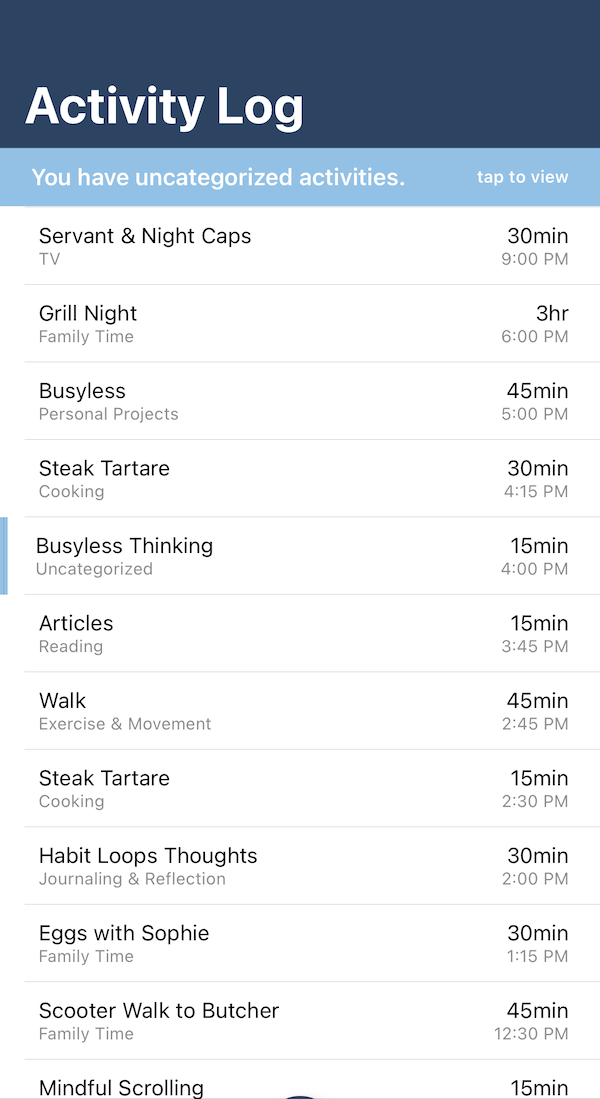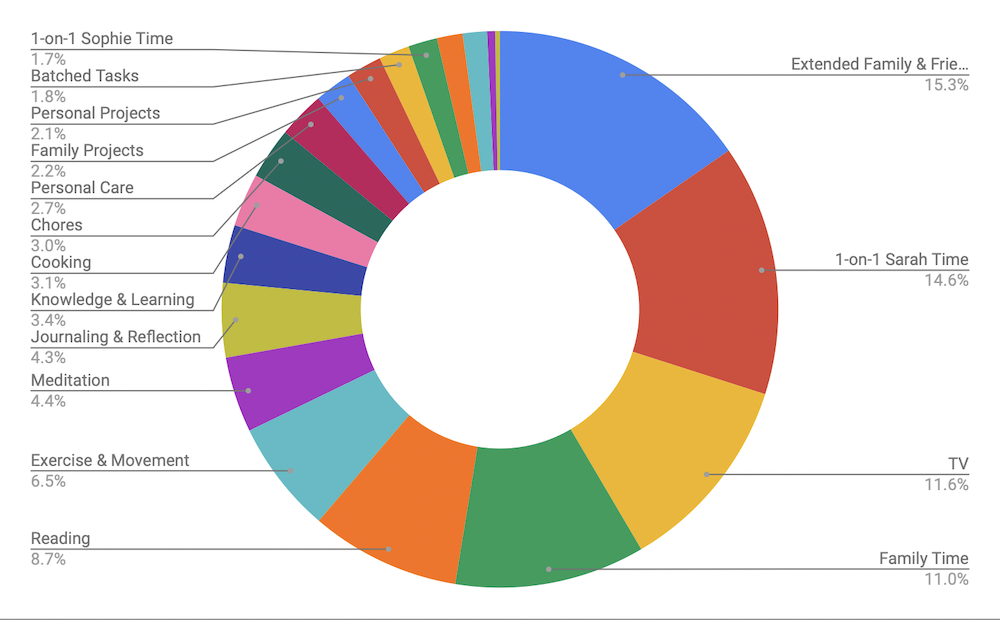I log my time. With some exceptions, almost every minute of every day. I know what you’re probably thinking: “that’s crazy”… or… “but why?” I get it. If I didn’t read a ton on logging time, or do it myself, I would be thinking the same. Give me a chance to explain the method behind my madness. You can still hate the idea, or maybe you’ll find something you can add to your own routine. Worse case this isn’t for you, you’ve only wasted 10 minutes of your time – and since you don’t log it, you’ll forget about it by tomorrow. 😃
What does it even mean to log time? It’s exactly what it sounds like. I log everything I do in 15 minute increments over the course of each day. I’ll be making a lot of comparisons to a financial budget – I think it’s the most familiar equivalent. Logging time is just like logging transactions for a checking account or a credit card to account for where your money (time) goes, making adjustments as necessary.
Let’s get into some of the specifics on how I log time and then I’ll talk about some reasons why. I personally prefer using my phone. I have an app I use to record each activity I engage in throughout the day. I just like having something that’s always with me, but tool you use to log your time, doesn’t matter. It could be pen and paper. The main thing is that it’s easy to access whenever you need it. I’ll sometimes record the activity prior to starting it, along with the estimated duration I hope to complete it. If time expires, I’ve set myself up to either call it done or mindfully choose to continue, helping to prevent myself from getting lost in a mindless activity. We’ve all been there… you sit down to watch TV, and realize 8 hours later you’ve just binged an entire season of that new show on Netflix. Other times I’ll record the activity after the fact – this is for unexpected things that come up throughout the day. The consistent part to both methods is doing it manually. In my opinion, this forces time to be spent mindfully by either planning what I’m about to do for next (and for approximately how long), or reflecting on how I just spent my time. I’ll also record a category to group similar activities so I can better analyze my time in the future (more on that later). For example, I might have an activity named by a TV show and the category as TV, or an activity named “dinner” and the category being “family time.” I’ve included a typical weekend day below to help visualize (yup, I even log time on the weekends 😄).

At this point you might be thinking, doesn’t this take up too much time? Sure, it does take up some time, but I’m willing to trade that time for the benefit of knowing exactly where my time goes. It takes time to manage a budget, right? That tradeoff is accepted by most financially responsible people in order to see where your money goes. Why is your time any different? Honestly, in most cases I feel my time is often more important than my finances. By budgeting (logging) my time I’m able to have more control as to where it goes. I’m able to be thoughtful about how I spend my time and reduce the amount of “time rabbit holes” I get myself into. In addition, I’m able to be reflective on how I spend my time on any given day. How many times have you finished a workday and said “I feel like I did a lot, but I can’t begin to tell you what I actually did”?
An added benefit of logging time is batching similar tasks. When I’m recording activities, I normally won’t add something like “empty the trash” (or whatever activity only taking a minute or two). Instead, I’ll decide to spend 15 or 30 minutes doing housework and record the time as “Chores.” I do this with checklist items, scrolling through the news, and reading articles, just to name a few.
Reflecting on how I spend my time I’ve found to be quite powerful. I’m pretty consistent, and rarely miss a day, but regardless, looking at time by category zoomed out monthly or quarterly leads to interesting conclusions. I use this to reflect on where I’m spending my time. Maybe I see that I’m spending more time watching TV than reading. The interesting thing I’ve noticed is, if I prefer TV to reading, as an example, I might not notice on a day to day basis – 30 minutes spent reading may feel like so much time whereas 30 minutes of TV feels like nothing. I might conclude that I’m reading more than I actually am. Said another way, looking at this data objectively over an extended period of time might tell a different story from the anecdotal day to day. Here’s an example of a recent month. I normally separate work and personal and I’m still working on what categories make the most sense.

One quick note on the tools I use. I use a combination of iOS shortcuts (for input), an app, and Google Sheets, but I’m purposely leaving the specifics out of this post to focus on the idea instead. I may publish a follow-up post with those specifics, but feel free to reach out if you’re interested and want tips on where to start. I’ve created a system that makes this very frictionless throughout my day and combines other concepts like “focus blocks” where I turn off all notifications to reduce the amount of multitasking and context switching.
I hope I’ve provoked some thoughts on how logging time could be helpful. At the very least, I hope I’ve conveyed my fundamental belief that everyone’s own time is important, and how it gets spent is completely within your control. We’re only on this earth for a short amount of time (related: highly recommend the book “Four Thousand Weeks”), so spending your time in a meaningful way is incredibly important. It’s easy to get wrapped up in “being busy” and equating that to a feeling of being fulfilled, productive, and/or efficient. I try hard not to use the word busy. Being busy is like spending money without a budget. You’re mindlessly moving from one thing to another but not choosing how you want to spend your time. Assuming sleep is taking up, on average, 8 hours a day, we have 112 hours a week to do whatever we want (ok, let’s take out 40 hours for a full time job, that’s still 72 hours!). That’s a hell of a lot of time. How are you spending it? How do you want to spend it?
comments powered by Disqus